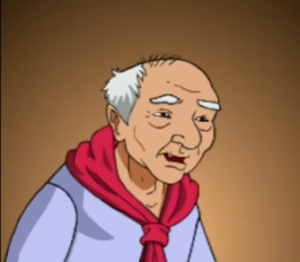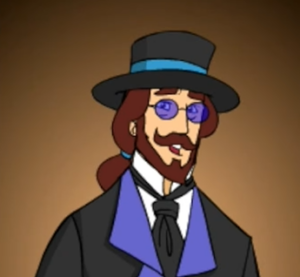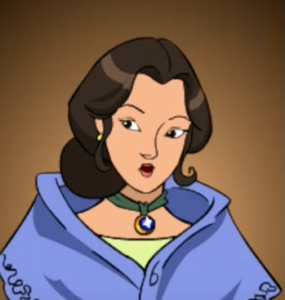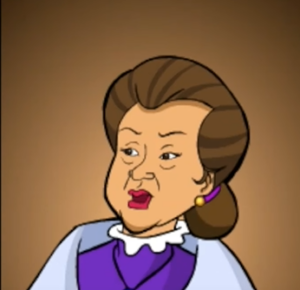Name: Florentino
Sex: M
Race: Indio
Occupation: Retired (formerly cleric/priest)
Affiliations: Unknown
Background
Padre Florentino is the only Indio priest mentioned in El Filibusterismo, since most Indios end up as priests’ assistants. He used to be considered charming and happy, and was part of a rich family and his mother forced him to enter the seminary (because of her friendship with the archbishop). While in school, he became classmates with Senor Pasta. Padre Florentino became a priest at 25 years old, and when his mother died, she left him his fortune.
It is said that weeks before Padre Florentino’s first mass, the woman he loved married someone else. Because of this, Padre Florentino devoted himself to the church. He became a well-respected cleric, but retired in 1872 to avoid attention. Since then, he has been living on the family estate, “on the shores of the Pacific”, in an unidentified province, with many servants. At some point, Padre Florentino adopted and raised a nephew (Isagani). There are rumors that Isagani is the son of Padre Florentino’s first love, or a son of Padre Florentino’s cousin, but the exact relationship between Isagani and Padre Florentino is never confirmed.
Story
Chapter 2: Padre Florentino is first mentioned when Basilio asks Isagani what his uncle thinks of Paulita Gomez. Isagani reveals to Basilio that Don Tiburcio is hiding from Dona Victorina in Padre Florentino’s house.
Padre Florentino is first introduced in this chapter as the only priest who is sitting below deck on steamship Tabo, rather than on the upper deck with the other priests. His past is described in this chapter. He has his servant call Isagani over. The skipper tells Padre Florentino to go up on deck or else the other friars will think he won’t want to join them. Before leaving, Padre Florentino tells Isagani not to go up on deck, because it would be an abuse of the skipper’s hospitality, but Isagani thinks Padre Florentino’s true goal is to prevent Isagani from talking to Dona Victorina, since he might reveal Don Tiburcio’s hiding place.
Chapter 3: Padre Florentino joins the rest of the friars on deck and listens to them complain about Indios and tell legends about the river.
Chapter 14: Padre Florentino is mentioned when he is revealed to be a former classmate of Senor Pasta.
Chapter 15: When Isagani first meets Senor Pasta, Senor Pasta asks how Isagani’s uncle is, referring to Padre Florentino. Later, after Isagani leaves, Senor Pasta is upset and pities Padre Florentino.
Chapter 24: While remembering his hometown as he describes it to Paulita Gomez, Isagani remembers how Padre Florentino used to preach against cloud-watching to Isagani. He once told Isagani that he would bring him to a physician because he might become a hypochondriac.
Chapter 31: It is mentioned that a week after Isagani’s arrest, Padre Florentino went to Manila just to free him.
Chapter 37: After visiting the Orenda house and hearing them speculate about the bomb plot, Isagani decides to leave and stay permanently with Padre Florentino.
Chapter 39: Padre Florentino is the main focus of the last chapter, which takes place in his house in the province. He is playing the reed organ while remembering a letter he got from the Teniente of the Guardia Civil, which said they were going to arrest a Spaniard at his house that night. Even though Padre Florentino tried to convince Don Tiburcio that it was not referring to him, Don Tiburcio still got scared and left.
Simoun arrived, wounded, with a chest and Padre Florentino took him in and tried to nurse him back to health. Padre Florentino wondered where Simoun’s wounds came from but Simoun refused to see a doctor. Padre Florentino told Simoun the police were coming at 8:00 pm to arrest him but Simoun just smiled.
Padre thinks that Simoun won’t hide because he is too proud. He decides not to blame Simoun for not helping free Isagani, and for helping plan Paulita Gomez and Juanito Pelaez’s wedding. Padre Florentino wonders if he should hide Simoun but his servant says Simoun wants to talk to him.
Padre Florentino goes to the bedroom and sees that Simoun is dying. He asks if Simoun is suffering, and realizes that Simoun drank something from a bottle. He asks what it was but Simoun does not answer. Simoun instead says he wants to tell Padre Florentino his secret and his last will.
Simoun asks Padre Florentino to tell him if there is a God. Padre Florentino offers to give Simoun an antidote. He kneels to pray and sits beside the bed to hear Simoun’s story. Simoun tells Padre Florentino his real name and Padre Florentino is shocked. Simoun tells him his entire story and Padre Florentino meditates.
He says the following, still calling Ibarra “Simoun”:
- That God will forgive Simoun because everyone makes mistakes.
- That God ruined Simoun’s plans on purpose because his methods were wrong, and that he should be thankful.
- That God has not abandoned His people and is there when the oppressed fight for their rights.
- That the country will only be free through acts of virtue, sacrifice and love.
- That God makes people suffer so that they can become better.
- That Indios must blame themselves because they can only earn liberty when they learn to stop abusing so they won’t end up as tyrants.
Simoun takes Padre Florentino’s hand. Padre Florentino wonders: where are the youth who will fight for their ideals and die for the country? Padre Florentino cries and lets go of Simoun’s hand. He goes to the window. When a servant lights the lamp, Padre Florentino realizes that Simoun is dead.
Padre Florentino prays for God to have mercy on Simoun. Padre Florentino gets Simoun’s chest and goes to a cliff overlooking the sea. Padre Florentino throws the chest into the sea and wishes that the chest will stay there until men need it.
Physical Description
Padre Florentino is described as looking quite old. His hair is almost all white and he has good posture. When he sits down, he keeps his body erect and head straight, but doesn’t look arrogant or prideful. His features are said to be “sad and sober”, but with “a tranquility of soul fortified by study and meditation and perchance put to test by intimate moral sufferings”, most likely due to his sad past.
Personality
Padre Florentino is different from the other priests because he is the only Indio priest (among the characters mentioned in El Filibusterismo). He is usually described as looking sad or somber, usually thinking of his past. He prefers to stay on the lower deck with Indios and students, rather than on deck with the wealthy and his fellow priests. This is pointed out as unusual, especially since Padre Florentino is both wealthy and a priest as well. He describes himself as a ‘poor Indio cleric’ and thinks his own house is “miserable, lost in the forest on the lonely shore of the sea”. (Chapter 39)
Even though he always seems unhappy, Padre Florentino is kind-hearted and helps various characters in El Filibusterismo. He is shown to have raised Isagani to be a good student and intelligent person. He is not greedy and is in fact respectful to everyone, even to his servants. He even reminds Isagani to not abuse the skipper’s hospitality (Chapter 2). Padre Florentino shows concern for his nephew throughout the book and eventually paying for him to be freed from prison in Manila (Chapter 31). He also helps Don Tiburcio and Simoun (Chapter 39).
Despite his wealth Padre Florentino doesn’t seem to care about money, because he throws Simoun’s box of jewels into the sea (Chapter 39).
Skills
Generosity
Padre Florentino never hesitates to help people and spends almost all of El Filibusterismo (El Fili) helping other people without expecting anything in return. He lets Don Tiburcio live in his house for months, goes to Manila to pay for Isagani to be freed from prison (Chapter 31) and treats a wounded Simoun, even warning him about the guardia civiles. Padre Florentino notes that Simoun didn’t help him free Isagani and that Simoun has done a lot of evil deeds, but that doesn’t stop him from immediately assisting Simoun, without asking questions. He listens to Simoun on his death bed and is upset when he finds out that Simoun poisoned himself, crying with empathy when Simoun passes away (Chapter 39).
Relationships
See Relationships of Padre Florentino.
Beliefs
On Freedom
“No, if our country is to be free one day it would not be through vice and crime; it will not be by corrupting its sons, deceiving some, buying others, no! Redemption implies virtue, virtue, sacrifice, and sacrifice, love!” (Padre Florentino, Chapter 39)
Padre Florentino supports independence for the Indios but believes they have to fight for it the right way. Instead of using violence and hate, the only weapons used should be virtue, sacrifice and love so that Indios will not end up cruel. Until Indios learn that they also should not be abusive, they will continue to be punished. But from suffering and working, Indios can learn from their experiences, spread their ideas, and eventually fight for liberty.
On Indios
“Where are the youth who will consecrate their golden hours, their illusions, and enthusiasm for the welfare of their country?” (Padre Florentino, Chapter 39)
Padre Florentino knows Indios are oppressed, but thinks this is necessary for them learn to become better people. He believes that if Indios do not suffer or fight for freedom using love, they will end up as tyrants like the Spanish. Padre Florentino feels sad that the youth do not fight and sacrifice themselves for their country.
On Religion
“He is the God of liberty, Senor Simoun, who obliges us to love Him by making the yoke heavy for us; a God of mercy, of equity who, while He punishes us improves us, and only concedes well-being to him who has deserved it with his efforts.” (Padre Florentino to Simoun, Chapter 39)
Padre Florentino explains to Simoun that God purposely makes people suffer to become better. But Padre Florentino doesn’t see God as cruel. Instead he thinks God is fair and that is His way of serving justice and not abandoning people. God is present when people fight for their rights. Padre Florentino tells Simoun that it was God who ruined his plans because his methods were wrong.
On Greed
“May Nature guard you in her deep abysses among the corals and pearls of her eternal seas! When for a holy sublime end men should need you, God will draw you from the breast of the waves… Meanwhile there you will do no evil, you will not distort right, you will not foment avarice…!” (Padre Florentino, Chapter 39)
The final scene of El Filibusterismo (El Fili) shows Padre Florentino throwing Simoun’s chest full of jewels into the sea. He believes the chest represents greed, which is one of the vices that is destroying the country. By getting rid of the chest, Padre Florentino believes he is helping get rid of an object that makes people do evil things.
Trivia
- Padre Florentino says the last line of El Filibusterismo (El Fili).
- Padre Florentino is said to be an accomplished musician, and plays the reed organ in Chapter 39.
Quotes
“I know that He has not abandoned the people who in the supreme moments have trusted in Him and made Him Judge of their oppression.” (Chapter 39)
“No, God who is justice, cannot abandon His own cause, the cause of freedom without which no justice is possible!” (Chapter 39)
“The glory of saving a country is not for him who has contributed to cause its ruin.” (Chapter 39)
“(To Simoun) You believed that what crime and iniquity have debauched and deformed, another crime and another iniquity could purify and redeem! Fallacy! Hate does not create anything but monsters, crime, criminals. Only love brings in the end marvelous works; only virtue can save! (Chapter 39)
“The just and the deserving must suffer so that their ideas may be known and spread out! The vase must be shaken or broken to spread its perfume; the rock has to be struck to bring out the spark!” (Chapter 39)
“An immoral government assumes a demoralized people, an administration without conscience, rapacious and servile citizens in the towns; bandits and brigands in the mountains! Like master, like slave; like Government, like country!” (Chapter 39)
“To suffer and to work!” (When Simoun asks what should be done, Chapter 39)
“The school of suffering tempers; the arena of combat strengthens the soul.” (Chapter 39)
“If Spain sees us less complacent with tyranny and more disposed to fight and suffer for our rights, Spain would be the first to give us liberty, because when the fruit of conception reaches maturity, woe unto the mother who would wish to stifle it!” (Chapter 39)
“Why independence if the slaves of today will be the tyrants of tomorrow?” (Chapter 39)






